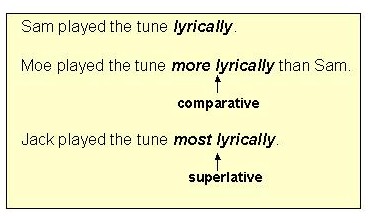|
ADVERBS
Adverbs are traditionally defined as words that describe verbs.
|
Adverbs answer any of the following questions about verbs:
|
|
|
|
how?
when? where? why?
|
|
The following examples illustrate adverbs modifying verbs:
|
|
|
|

|
|
How
did he lift the barbell?
|
|
Easily
is an adverb.
|
|
|
|

|
|
When will we use it?
|
|
Tomorrow functions as an
adverb.
|
|
|
|

|
|
Where did
she hide the key?
|
|
Nearby
is an adverb.
|
|
Adverbs are the most moveable of all parts of speech;
therefore, it is sometimes difficult to identify an adverb on the basis of
its position in a sentence.
|
|
|
|
For example, the adverb slowly will fit into three places in
the sentence He climbed the ladder:
|


Flat adverbs
Adjectives that do not change form (add -ly) to become adverbs are called
"flat adverbs."
Typical flat adverbs are
early, late, hard, fast, long, high, low, deep, near.
|
To determine whether these words are functioning as
adjectives or adverbs, one must determine
|
|
|
|
1)
what the word is describing (noun or verb)
|
|
2)
what question the word is answering
|
|
The following examples illustrate the distinction.
|
|
|
|
Early as adjective:
|
|

|
|
Early
describes the noun train and
answers the question "which one?"
|
|
|
|
Early as adverb:
|
|

|
|
Early
describes the verb arrived and
answers the question "when?"
|
|
|
|
Hard as adjective:
|
|

|
|
Hard
describes the noun pass and
answers the question "what kind?"
|
|
|
|
Hard as adverb:
|
|

|
|
Hard
describes the verb threw and
answers the question "how?"
|
|